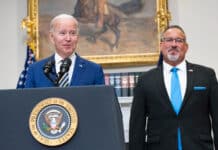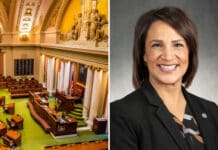
DFL legislators in the House weren’t able to garner support from all 70 of their members on a bill that would make Minnesota the 12th state in the nation to mandate businesses provide paid family and medical leave for their employees.
But they got enough votes to get the job done, and passed the hotly-contested HF2 on Tuesday with a 68-64 vote, along mostly party lines. Two DFL legislators who voted against final passage of the bill were Dave Lislegard, of Aurora, and Gene Pelowski, of Winona.
Democrats in the Senate won’t have any wiggle room if they hope to pass the bill in the waning days of the legislative session, as they hold just a one-vote margin over Republicans in that chamber.
HF2 would establish a state-run insurance program that would provide workers up to 12 weeks of paid family leave and 12 weeks of medical leave per year. The program would be funded by an increase on employer payroll taxes and go into effect by July 1, 2025. No Republicans in the House supported the bill. They instead offered a slimmed down version via a floor amendment that failed to pass by a 4-vote margin, but received support from DFler Lislegard.
Will any DFLers vote “no” on HF2 in its current form when it hits the Senate floor later this month?
Democratic senators from Greater Minnesota — Rob Kupec of Moorhead, Grant Hauschild of Hermantown and Aric Putnam of St. Cloud — refrained from commenting on the bill when it came through the Senate Jobs and Labor committees they sit on earlier this session.
Kupec has intimated to media in his Senate district that he favors some form of paid family and medical leave legislation but didn’t elaborate on specifics. Hauschild has also expressed support outside the Capitol. Another first-term DFL senator, Judy Seeberger of Afton, has been quiet on the bill. But according to a MinnPost article last fall Seeberger expressed support for some form of the legislation. All of those votes will be key for the DFL in securing passage of HF2 in the Senate, where Democrats hold just a 34-33 majority over Republicans.
House Republicans and DFLers debate mandates on businesses
Prior to its passage on the House floor on Tuesday, Democrats and Republicans debated competing versions of what a paid family and medical leave system might look like in Minnesota.
House sponsor Rep. Ruth Richardson, DFL-Mendota Heights, said the legislation presents a “long-overdue safety net” to correct racial and socioeconomic disparities among workers whose employers don’t currently offer paid medical and family leave.
Republicans argue that the legislation’s “one-size-fits-all” approach will harm independent and small businesses across the state. Several representatives from business community organizations submitted written opposition to the bill or testified before committees, arguing it would harm small business owners by increasing payroll taxes dramatically and that its mandatory component is an outlier compared to other states with similar programs.
Funding for the new state-mandated benefit program would be kick-started with nearly $670 million from the budget surplus before revenues collected by a new tax on employers would begin to accrue, according to language in the bill. These funds would be overseen by a new office of “Family and Medical Benefits Insurance” managed by DEED.
Employers who already have or begin equivalent or greater private plans would not be required to pay premiums into the state program.
Near the outset of seven hours of debate over the hotly contested legislation, Rep. Dave Baker, R-Willmar, offered an amendment that would have replaced the bill in its entirety with what he described as a “more realistic approach” that would eliminate the mandate on employers but allow them to voluntarily enroll in a plan the state provides via a preferred insurance company. Employers participating in that plan would receive small business tax credits as incentive to enroll in the program.
“Families and employees would love something like this,” said Baker. “But ‘how do we get there?’ is what [this amendment] does today.”
“Members, if you took this [amendment] today, we could have a private program up and running by the end of this year. Because it’s already being done in other states,” said Baker, comparing his plan as similar to one that debuted in New Hampshire earlier this year.
After that amendment failed, Republicans were able to get bipartisan support for an amendment offered by Rep. Harry Niska, R-Ramsey, that would require anyone who fraudulently obtains paid family leave benefits to be reported to the county attorney.
Language in the bill would allow the Department of Employment and Economic Development to raise payroll taxes to maintain the program’s solvency. Under the Senate version of the bill, the commissioner would not be able to raise taxes beyond 1.2 percent of a worker’s taxable wages.
During the committee hearing process, Republicans in both chambers argued the legislation would harm small businesses in a number of ways, especially those who have small workforces that won’t be able to hire additional staff soon enough to cover the responsibilities of employees taking paid leave.
Democrats also added language to the bill during the House floor debate that would permit an additional six weeks of pregnancy leave on top of the 18-week maximum if there are documented complications with the pregnancy.
Hank Long
Hank Long is a journalism and communications professional whose writing career includes coverage of the Minnesota legislature, city and county governments and the commercial real estate industry. Hank received his undergraduate degree at the University of Minnesota, where he studied journalism, and his law degree at the University of St. Thomas. The Minnesota native lives in the Twin Cities with his wife and four children. His dream is to be around when the Vikings win the Super Bowl.

















